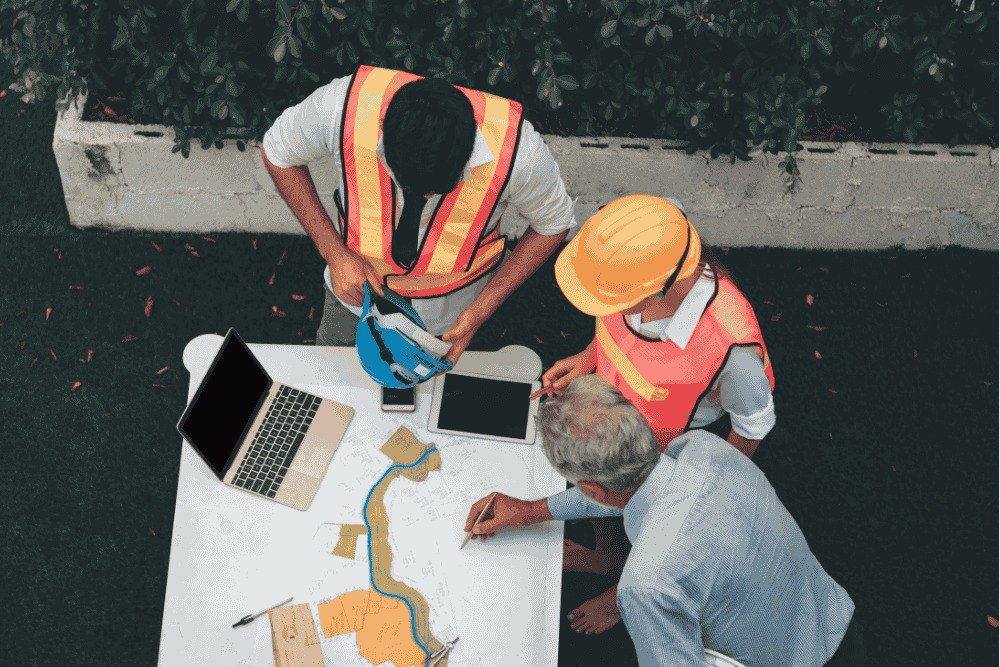Construction Project Team Roles | Who Does What
Construction projects involve the collaboration of a variety of skilled professionals working together to bring a vision to life. Understanding the construction project team roles is crucial for ensuring the success of any project, whether it’s a commercial building, residential development, or infrastructure project. Each team member has a specific responsibility that contributes to the overall efficiency, safety, and quality of the construction process.
In this guide, we will explore the different roles within a construction project team and how each individual contributes to project success. Whether you’re a project manager, contractor, or stakeholder, understanding these roles helps streamline communication and ensures that projects are completed on time and within budget.
The Importance of a Well-Structured Construction Team
In any construction project, success is highly dependent on the people involved. A well-organized team not only drives efficiency but also ensures that potential issues are identified and resolved quickly. From the very first stages of design to the final walkthrough, each role plays an essential part in delivering a quality project.
A construction project team typically consists of several key roles, each with its own area of expertise. Understanding these roles is essential for stakeholders to ensure that every aspect of the project is covered, and that the team can function at its highest capacity.
Project Manager: The Central Coordinator
At the heart of any construction project is the Project Manager. This individual is responsible for overseeing the entire project from start to finish. The Project Manager’s primary role is to ensure that the project meets its objectives, stays on schedule, and is completed within budget.
Key responsibilities:
- Managing project scope, schedule, and costs
- Communicating with stakeholders
- Coordinating the activities of the entire construction team
- Overseeing risk management and problem resolution
The Project Manager ensures that all aspects of the project run smoothly and that the client’s vision is realized effectively. Without a skilled Project Manager, even the most well-planned projects can go off track.
Construction Manager: On-Site Leadership
While the Project Manager oversees the overall project, the Construction Manager is responsible for the daily operations on the construction site. This role is essential for ensuring that the construction team works efficiently and that safety protocols are strictly followed.
Key responsibilities:
- Managing site logistics and resource allocation
- Supervising contractors and subcontractors
- Ensuring adherence to safety standards
- Monitoring progress and quality control on-site
The Construction Manager’s role is key to the smooth day-to-day operations of a construction site, ensuring that the work is progressing as planned.
Architect: Designing the Vision
The Architect is responsible for designing the project’s blueprint and ensuring that the design aligns with the client’s needs, building codes, and environmental regulations. The Architect works closely with the project stakeholders to create a design that is both functional and aesthetically pleasing.
Key responsibilities:
- Developing the project’s design and drawings
- Ensuring compliance with local building codes
- Collaborating with engineers and contractors to refine the design
- Addressing design issues and adjustments during construction
The Architect brings the vision of the project to life through detailed plans, ensuring that the structure is both functional and safe.
Engineers: Specialists in Technical Design
Depending on the type of construction project, multiple engineers may be involved. These can include structural, electrical, mechanical, and civil engineers. Each engineer ensures that the technical aspects of the design are sound and that construction is feasible within the given parameters.
Key responsibilities:
- Structural engineers focus on the safety and stability of the building.
- Electrical engineers design the electrical systems and integrate them with the building.
- Mechanical engineers handle systems like HVAC and plumbing.
- Civil engineers ensure that the site’s infrastructure and groundwork are suitable for construction.
Engineers are crucial for ensuring that the design is technically viable and that the building functions properly once constructed.
Contractors: The Builders
Contractors are the backbone of the construction team. They are responsible for executing the work outlined in the project’s design. General Contractors oversee the entire construction process, while Subcontractors specialize in specific tasks such as electrical work, plumbing, or masonry.
Key responsibilities:
- Managing labor and construction materials
- Supervising skilled tradespeople (e.g., electricians, plumbers, carpenters)
- Ensuring the work complies with design and safety standards
- Collaborating with the Project Manager to keep the project on track
Contractors and subcontractors play a vital role in ensuring that the physical construction of the project is completed efficiently and to specification.
Surveyor: Mapping and Measuring
A Surveyor plays an integral role in both the planning and construction phases. Surveyors provide precise measurements and mapping of the land or site, ensuring that construction follows the correct lines and elevations.
Key responsibilities:
- Conducting site surveys before construction begins
- Providing detailed topographical maps
- Ensuring proper alignment of structures
- Assisting in property boundary determination
Surveyors provide the foundational data required for all construction projects, ensuring that designs are accurately implemented.
Legal and Compliance Experts: Navigating Regulations
Every construction project must adhere to local building codes, safety standards, and legal requirements. Legal and Compliance Experts ensure that the project meets all necessary legal obligations and handle issues such as contracts, permits, and disputes.
Key responsibilities:
- Reviewing and negotiating contracts
- Securing necessary permits and licenses
- Ensuring compliance with local zoning laws and safety regulations
- Addressing legal disputes that arise during the project
Having legal and compliance experts on the team ensures that the project avoids costly fines, delays, and legal complications.
Final Thoughts
The construction project team is a collaborative effort, with each role serving a specific purpose to ensure the project’s success. From the early planning stages through to completion, every individual involved in the process plays a critical part in delivering a finished product that meets the client’s expectations. Clear communication, coordinated efforts, and well-defined responsibilities are key to keeping the project on schedule and within budget.
Each construction project is unique, and understanding the roles and responsibilities of the team members helps ensure that all aspects of the project are properly managed. By recognizing the value of each role, you can create a more effective and cohesive construction team that drives project success.
FAQs about Construction Project Team Roles
What is the difference between a Project Manager and a Construction Manager?
The Project Manager oversees the entire project from a high level, ensuring it stays on schedule and within budget. The Construction Manager, on the other hand, focuses on the day-to-day operations at the construction site, overseeing the physical work and ensuring safety and quality standards are met.
Why is the Architect’s role so important in a construction project?
The Architect is responsible for translating the client’s vision into detailed design plans. Their role ensures that the design complies with building codes and regulations, and they collaborate with engineers and contractors to ensure the design is feasible and practical for construction.
How do engineers contribute to the success of a construction project?
Engineers ensure that the construction project is technically sound. Structural engineers ensure the building’s stability, while mechanical and electrical engineers handle systems like plumbing, heating, and electrical systems. Their input is essential for the functionality and safety of the building.
What are the responsibilities of contractors and subcontractors?
Contractors are responsible for overseeing the construction process, including managing workers and materials. Subcontractors specialize in specific tasks such as electrical, plumbing, or roofing work. Together, they ensure that the building is constructed according to the design specifications.
What role does a Surveyor play during a construction project?
Surveyors provide crucial site measurements and maps, ensuring that the construction is accurately aligned with the design. They help with land boundary determination and site preparation, making them essential during the early planning stages and throughout construction.
Ready to Take Your Construction Projects to the Next Level?
Description: Book your Free Consultation today and discover how we can help you plan, manage, and execute your projects with efficiency and confidence.




